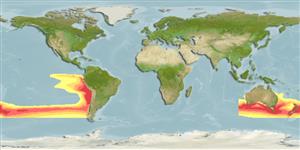Preferred temperature (Ref.
115969): 14.1 - 22.6, mean 16.5 (based on 352 cells).
Phylogenetic diversity index (Ref.
82804): PD
50 = 0.5001 [Uniqueness, from 0.5 = low to 2.0 = high].
Bayesian length-weight: a=0.01202 (0.00749 - 0.01931), b=2.93 (2.79 - 3.07), in cm Total Length, based on LWR estimates for this species & Genus-body shape (Ref.
93245).
ระดับชั้นอาหาร (Ref.
69278): 3.3 ±0.2 se; based on diet studies.
ความสามารถในการกลับคืนสู่ปกติ (Ref.
120179): ขนาดกลาง, เวลาต่ำสุดที่จะทำให้ประชากรเพิ่มขึ้นเป็น 2 เท่าใช้เวลา 1.4 - 4.4 ปี (K=0.09-0.11; tmax=16).
Prior r = 0.52, 95% CL = 0.34 - 0.77, Based on 1 full stock assessment.
Fishing Vulnerability (Ref.
59153): High to very high vulnerability (67 of 100).
Climate Vulnerability (Ref.
125649): Moderate vulnerability (35 of 100).
